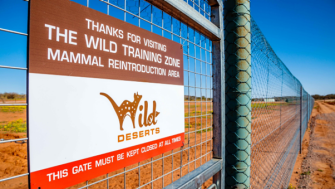
Synopsis
The wild training zone (WTZ) of the Wild Deserts project is designed as a training ground for predator-naïve reintroduced mammals to learn key skills to survive alongside feral predators. Invasive carnivore populations still need to be managed in this zone to balance learning against predation risk, and even native herbivores need to be managed there to control competition with threatened species. This project will assess the potential use of acoustic deterrents – and particularly ultrasonic sounds - to deter incursions by macropods and eutherian carnivores into the WTZ at a key point of entry (a cattle grid on the highway), and the effectiveness of the system in deterring these species from points in the wider landscape. While ultrasonic signals in particular have been shown to be aversive to some mammals, their potential in this context has not yet been formally evaluated.
Aims
This project will conduct playback experiments – and evaluate existing playback data - in Sturt National Park to determine the effectiveness of acoustic devices as kangaroo and eutherian predator deterrents at the entry point to the Wild Training Zone at Wild Deserts.
Student benefits
This is a field-based study where you will gain experience in experimental design and developing techniques to deter kangaroos and eutherian carnivores in a remote location.
Through this project you will learn how to:
- Plan and conduct fieldwork in a remote and challenging field setting
- Conduct playback studies in the wild
- Carry out statistical analysis
- Write a scientific paper
- Collaborate with conservation professionals on the ground
Covid-19 risk mitigation strategies have been considered in the development of this study.
Supervisors: Dr Neil Jordan, Dr Rebecca West, Dr Reece Pedler
Get involved
To learn more about this project, contact Dr. Neil Jordan
E: neil.jordan@unsw.edu.au, opens in a new window
T: +61-2-68811452
